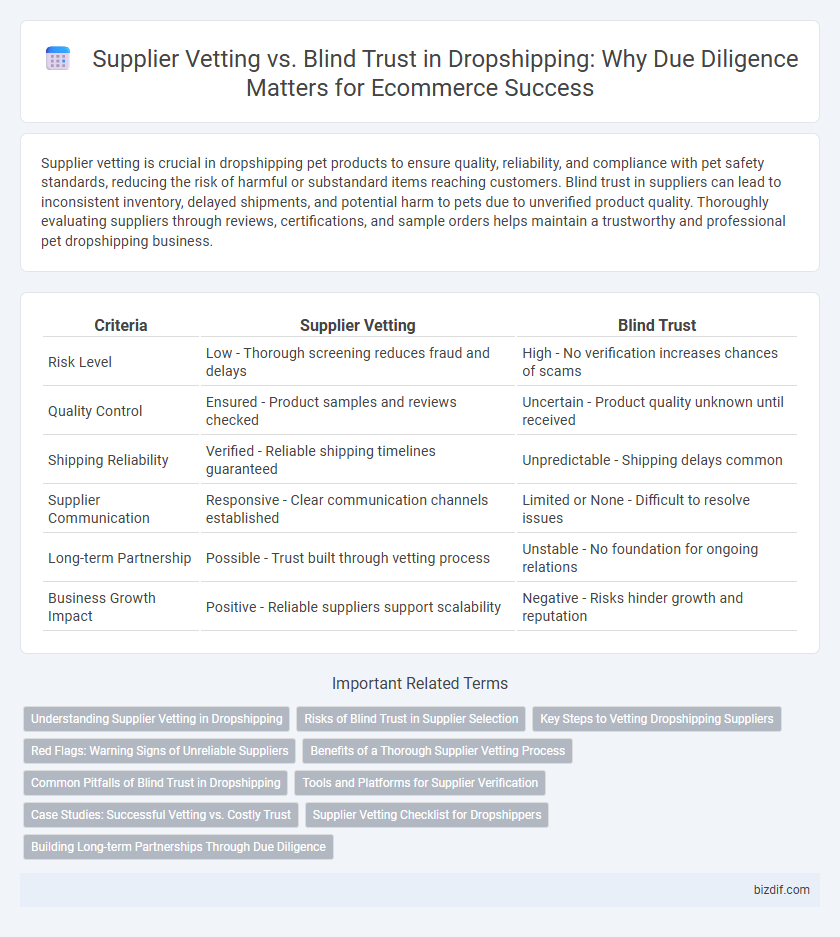Supplier vetting is crucial in dropshipping pet products to ensure quality, reliability, and compliance with pet safety standards, reducing the risk of harmful or substandard items reaching customers. Blind trust in suppliers can lead to inconsistent inventory, delayed shipments, and potential harm to pets due to unverified product quality. Thoroughly evaluating suppliers through reviews, certifications, and sample orders helps maintain a trustworthy and professional pet dropshipping business.
Table of Comparison
| Criteria | Supplier Vetting | Blind Trust |
|---|---|---|
| Risk Level | Low - Thorough screening reduces fraud and delays | High - No verification increases chances of scams |
| Quality Control | Ensured - Product samples and reviews checked | Uncertain - Product quality unknown until received |
| Shipping Reliability | Verified - Reliable shipping timelines guaranteed | Unpredictable - Shipping delays common |
| Supplier Communication | Responsive - Clear communication channels established | Limited or None - Difficult to resolve issues |
| Long-term Partnership | Possible - Trust built through vetting process | Unstable - No foundation for ongoing relations |
| Business Growth Impact | Positive - Reliable suppliers support scalability | Negative - Risks hinder growth and reputation |
Understanding Supplier Vetting in Dropshipping
Supplier vetting in dropshipping involves a thorough evaluation of potential suppliers' reliability, product quality, and shipping performance to minimize risks and ensure consistent customer satisfaction. This process includes verifying business credentials, checking customer reviews, and testing product samples before establishing partnerships. Effective supplier vetting reduces the likelihood of stockouts, counterfeit goods, and delayed deliveries that can damage a dropshipping business's reputation.
Risks of Blind Trust in Supplier Selection
Relying on blind trust in supplier selection exposes dropshipping businesses to risks such as inconsistent product quality, delayed shipments, and inaccurate inventory data, which can damage customer satisfaction and brand reputation. Without thorough supplier vetting, companies may encounter fraudulent suppliers or those with poor communication, leading to financial losses and operational disruptions. Implementing a rigorous vetting process mitigates these risks by ensuring reliability, compliance, and long-term partnership viability.
Key Steps to Vetting Dropshipping Suppliers
Effective dropshipping supplier vetting involves verifying supplier reliability, product quality, and shipping capabilities to minimize risks associated with blind trust. Key steps include researching supplier reviews, requesting product samples, and assessing communication responsiveness and return policies. Thorough vetting safeguards customer satisfaction and ensures consistent order fulfillment in dropshipping operations.
Red Flags: Warning Signs of Unreliable Suppliers
Unreliable dropshipping suppliers often exhibit red flags such as inconsistent communication, delayed shipping times, and poor product quality reviews. Missing or vague business credentials, lack of clear return policies, and unwillingness to provide product samples also signal potential risks. Thorough supplier vetting helps identify these warning signs early, preventing costly disruptions and protecting brand reputation.
Benefits of a Thorough Supplier Vetting Process
Thorough supplier vetting mitigates risks by verifying product quality, delivery times, and supplier reliability, ensuring consistent customer satisfaction in dropshipping businesses. It enhances brand reputation by partnering only with credible suppliers, reducing the likelihood of counterfeit or substandard goods. This process also streamlines inventory management and minimizes costly disruptions caused by unreliable suppliers.
Common Pitfalls of Blind Trust in Dropshipping
Relying on blind trust in dropshipping often leads to issues like delayed shipments, poor product quality, and inconsistent inventory, causing customer dissatisfaction and returns. Many dropshippers fall into the trap of choosing suppliers without thorough vetting, risking fraud or unreliable service. Comprehensive supplier vetting--including verifying reviews, testing orders, and assessing communication--is essential to avoid these common pitfalls and ensure a stable supply chain.
Tools and Platforms for Supplier Verification
Effective supplier vetting in dropshipping relies heavily on specialized tools and platforms such as Alibaba's Trade Assurance, Oberlo, and SaleHoo that verify supplier authenticity and product quality. These platforms provide critical data points including customer reviews, transaction history, and supplier certifications to reduce risk compared to blind trust. Utilizing supplier verification tools enhances reliability, prevents fraud, and ensures consistent product delivery in the competitive dropshipping market.
Case Studies: Successful Vetting vs. Costly Trust
Case studies reveal that businesses employing rigorous supplier vetting in dropshipping achieve higher product quality, timely shipments, and reduced return rates, driving customer satisfaction and profit growth. In contrast, ventures relying on blind trust often face stockouts, counterfeit products, and delayed deliveries, incurring significant financial losses and reputational damage. Data from successful dropshipping companies underscore supplier verification tools, trial orders, and transparent communication as critical practices to mitigate risks and optimize supply chain reliability.
Supplier Vetting Checklist for Dropshippers
A comprehensive supplier vetting checklist for dropshippers includes verifying supplier legitimacy, assessing product quality through samples, evaluating shipping times, and reviewing customer service responsiveness. Checking business credentials, reading third-party reviews, and confirming return policies reduce risks compared to blind trust in unknown suppliers. Utilizing data-driven evaluation ensures consistent order fulfillment and customer satisfaction in dropshipping operations.
Building Long-term Partnerships Through Due Diligence
Supplier vetting is crucial for dropshipping success, involving rigorous assessment of product quality, shipping times, and reliability to minimize risks and ensure consistent customer satisfaction. Blind trust in suppliers often leads to inventory issues, delayed shipments, and damaged brand reputation, undermining business growth. Building long-term partnerships through due diligence fosters transparency, mutual accountability, and scalable collaboration that drives sustained profitability.
Supplier Vetting vs Blind Trust Infographic

 bizdif.com
bizdif.com